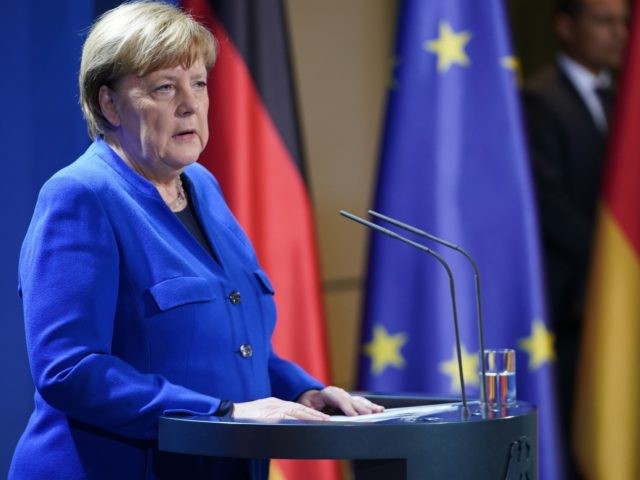A survey pitting outgoing German Chancellor Angela Merkel against current French President Emmanuel Macron for the head of the European Commission has suggested that many EU countries would support a Merkel presidency.
The European Council of Foreign Relations (ECFR) survey asked residents of 12 European Union countries if they would support Mrs Merkel or Mr Macron in a theoretical race if the pair were to face off for the “president of the EU” role.
Mrs Merkel — who as German chancellor has already been the de-facto leader of Europe for 16 years — won a plurality of the votes in every country, including France, and an outright majority of the votes in the Netherlands, Spain, and Portugal.
Even in France, where Emmanuel Macron currently serves as president, Merkel beat the French leader by 12 per cent, though nearly half said they either did not know which candidate to choose or stated they would not vote.
In total, 41 per cent said they supported Merkel as head of the European Commission, and just 14 per cent said the same for Macron.
The poll was — probably deliberately — vague about which EU “presidency” respondents were voting for. While the question asked which of the two leaders would be best for a “president of the EU” role, the European Union actually has four presidents, the leaders of the Parliament, Council, Commission, and Council of Ministers.
That said, the ECFR survey also asked questions specifically about the President of the European Commission, who is presently former German defence minister and Merkel protege Ursula von der Leyen. This is broadly considered to be the most high profile of the EU presidents — the Commission President takes part in G7 summits, for instance — and may have been the role the ECFR were obliquely asking about.
In June, a similar poll conducted by the Pew Research Center on global leadership saw Mrs Merkel come out as the leader most trusted to lead the world ahead of U.S. President Joe Biden and President Macron.
According to a Tuesday report for The Times newspaper, while Merkel has announced she will be stepping down as German chancellor after this month’s German federal election, there is expectation she may even remain in the role into the New Year due to coalition negotiations that are expected to be protracted.
Shock Poll: Merkel’s Party Falls Behind Social Democrats as Migrant Crisis Looms https://t.co/FNx9xveteS
— Breitbart London (@BreitbartLondon) August 26, 2021
The question of Merkel running for European President is part of the broader ECFR report labelled “Beyond Merkelism: What Europeans expect of post-election Germany”, which also sees respondents showing confidence in Germany defending their economic interest as well as standing up for democratic values, but have low confidence in Germany’s ability to handle relations with the USA, China, or Russia.
“These findings confirm that EU citizens do not necessarily trust Germany to lead the EU in their interests in a world of intensifying great power competition. When it comes to geopolitics, Berlin’s credibility is limited – especially in comparison to other policy areas,” the report notes.
“Europeans appear to see her as being not very ‘geopolitical’, suggesting that the diplomatic (and military) efforts of the German government have either gone unnoticed or been ineffective during the foreign policy crises of recent years,” the authors add.
As Merkel leaves the political stage in Germany, the German respondents to the ECFR survey appear noticeably negative toward the future of their country, with 52 per cent saying the country’s golden age is in the past, compared to 34 per cent of all the countries surveyed.
After previously backing open borders and migrant quotas, Merkel now says that Belarus pushing migrants to EU 'unaccpetable' https://t.co/We4DRfDpCD
— Breitbart London (@BreitbartLondon) September 11, 2021
“This overall picture suggests that, should scepticism about Germany’s prosperity become more widespread in Europe, Europeans may become less willing to see Berlin as a pillar of Europeanism,” the report states and adds: “Growing scepticism about Germany’s economy would erode trust in its ability to lead Europe, severely impeding its ability to do so.”
Going into the September 26th election, Merkel’s successor and head of the Christian Democratic Union (CDU) Armin Laschet is polling far behind the Social Democrat (SPD) leader Olaf Scholz who could succeed Merkel as chancellor.
In an interview with CNBC, former SPD leader Martin Schulz stated that a Scholz government would not be a continuation of Merkel.

COMMENTS
Please let us know if you're having issues with commenting.